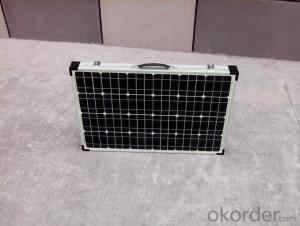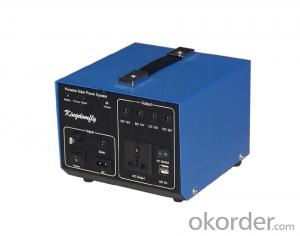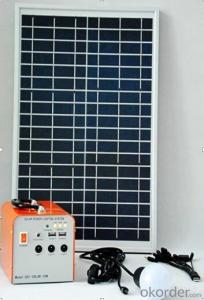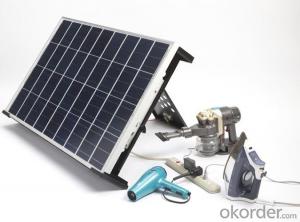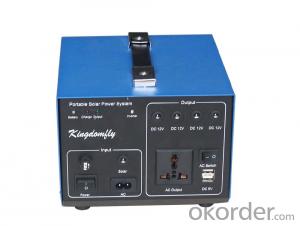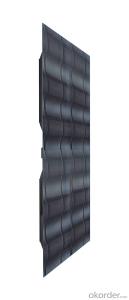Solar Portable System AN-S20W
- Loading Port:
- Shanghai
- Payment Terms:
- TT OR LC
- Min Order Qty:
- 0 set
- Supply Capability:
- 10000 set/month
OKorder Service Pledge
OKorder Financial Service
You Might Also Like
Item specifice
Description of Solar Portable System AN-S20W
Compatible portable solar power supply, also called solar mobile power, it includes: solar panel, charge controller, discharge controller, electric charge controller, inverter, outside enlarge capacity interface and battery, etc. Photovoltaic portable power supply can work in solar energy and ordinary power two modes, and can automatically switch. Photovoltaic portable power supply is used widely is the emergency relief, tourism, army, geological prospecting, archaeology, schools, hospitals, Banks, gas stations, comprehensive building, highway, substation, family camping or outdoor activities such as emergency power ideal power supply equipment.
Specifications of Solar Portable System AN-S20W
1. Solar Panel: 20W 18V
2. Battery: 12V12AH lead-acid battery
Input terminal: 1 DC input, 9V
Output terminal: 4 output terminals, including:
1x USB output, 5V 1A;
3x DC outputs, 6V 1A
Switch: one square On/Off general switch
Indication lamp: 2 pcs; Red one is for charging indication, Green one is for operating indication.
Accessories of Solar Portable System AN-S20W
1. 2pcs 3W led bulbs;
2. 1pc 3m connection wire between solar panel and cabinet;
3. 2pcs lamp holder with 3m wire;
4. 1pc AC charger
Technical Data of Solar Portable System AN-S20W
| Internal Package Size (cm) | 26*16.5*21 |
| Packing QTY | 4 |
| External Package Size (cm) | 30*47*43.5 |
IMages of Solar Portable System AN-S20W
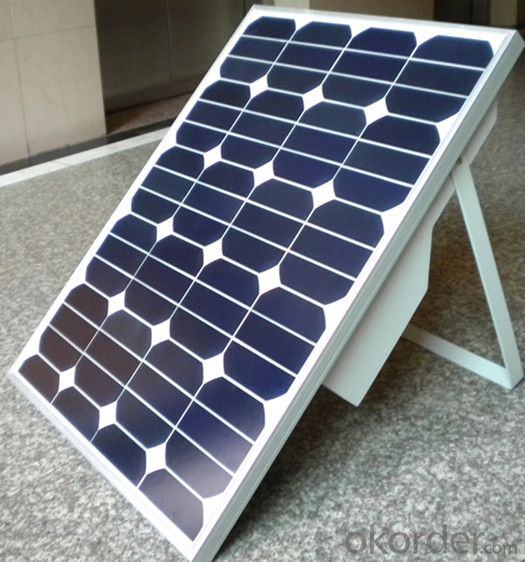
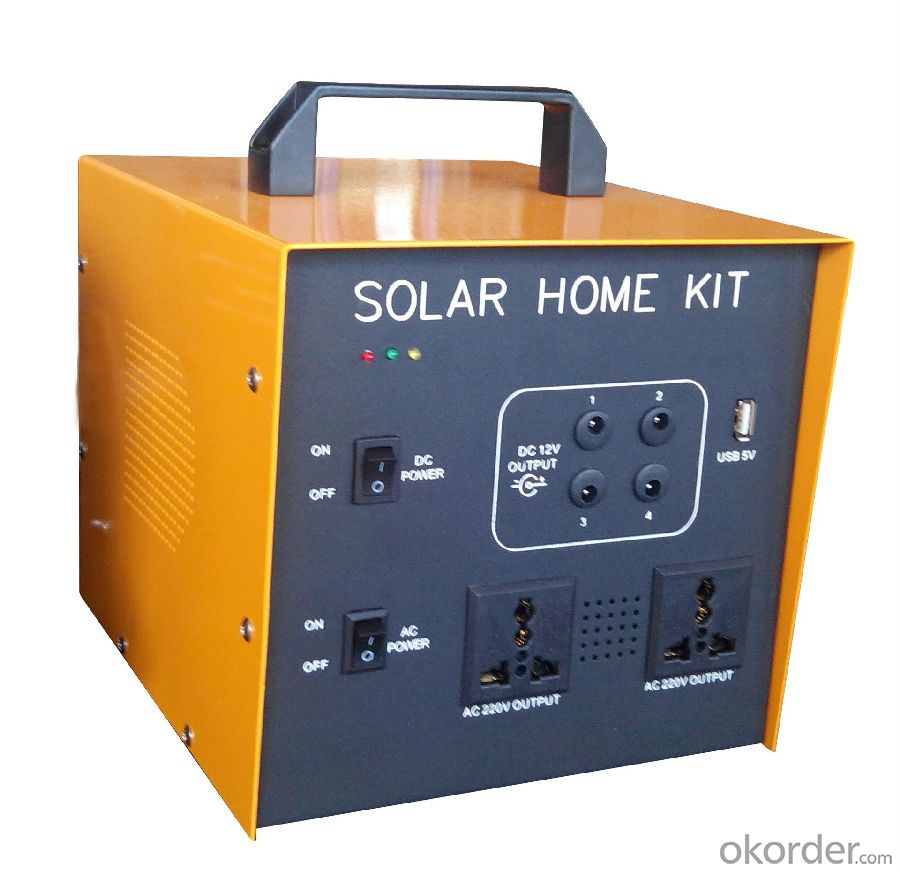
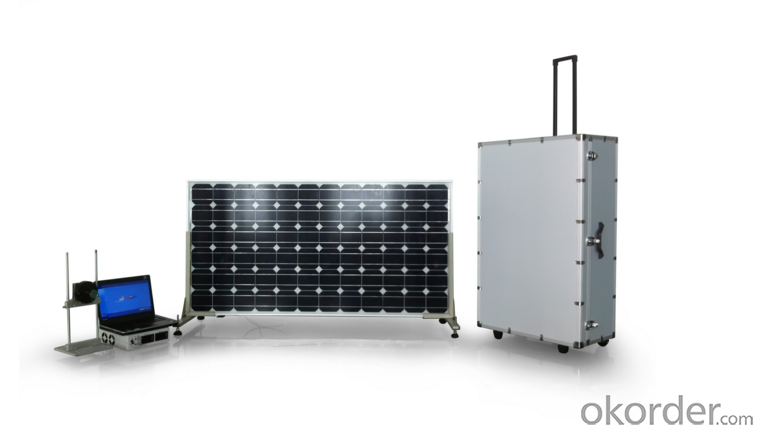
FAQ:
1. How long will my inquiry get response?
Your inquiry related to our products or prices will be replied within 24 hours.
2. Can I get professional service and suggestion?
Well-trained and experienced staffs to answer all your questions in fluent English.
3. Do you accept OEM or customized design?
OEM & ODM, any your customized lightings we can help you to design and put into product.
4. What if I need specific design?
Distributorship are offered for your unique design and some our current models.
- Q:Can solar panels be used to power streetlights?
- Yes, solar panels can be used to power streetlights. Solar energy can be converted into electricity and stored in batteries, which can then be used to power the streetlights during the night. This renewable energy source is increasingly being employed to reduce reliance on traditional power grids and promote sustainability.
- Q:Can solar energy systems be used in areas with limited access to solar energy incentives and rebates?
- Yes, solar energy systems can still be used in areas with limited access to solar energy incentives and rebates. While incentives and rebates can provide financial benefits and make solar energy more affordable, the installation and use of solar energy systems is not solely dependent on these incentives. Solar energy systems can still be a viable and sustainable option for generating clean energy in areas with limited incentives, as they can help reduce electricity bills and reliance on traditional energy sources. Additionally, advancements in solar technology have made systems more efficient and cost-effective, making them a feasible choice even without incentives.
- Q:Can a solar energy system be installed in areas with frequent lightning strikes?
- Yes, a solar energy system can be installed in areas with frequent lightning strikes. However, certain precautions and safety measures need to be taken during installation to protect the system from potential damage caused by lightning strikes. These precautions typically include grounding the system, installing surge protection devices, and using proper lightning arrestors to divert lightning strikes away from the system. By following these safety guidelines, solar energy systems can be successfully installed and operated in areas prone to frequent lightning strikes.
- Q:Can solar energy systems be used in military applications?
- Yes, solar energy systems can be used in military applications. Solar technology has proven to be highly adaptable and reliable, making it an attractive option for military operations. The military has recognized the benefits of solar energy systems in terms of reducing dependence on fossil fuels and improving energy security in remote or volatile regions. One of the key advantages of solar energy systems in military applications is their portability. Solar panels and related equipment can be easily transported and deployed in various locations, providing power for small-scale operations or even entire bases. This flexibility allows military units to operate in off-grid or austere environments where traditional energy sources may be scarce or unreliable. Solar energy systems can also enhance the sustainability and resilience of military operations. By generating renewable energy on-site, the military can reduce its carbon footprint and decrease reliance on vulnerable supply chains for fuel. Solar power can be integrated with energy storage solutions to ensure continuous power supply, even during grid outages or in combat situations. Furthermore, solar energy systems contribute to cost savings in the long run. While the initial investment may be higher compared to conventional energy sources, solar technology has become increasingly affordable. Over time, the operational and maintenance costs of solar systems are significantly lower than those of conventional energy sources. This can result in substantial savings for the military, allowing resources to be allocated to other critical areas. In addition to these benefits, solar energy systems also offer enhanced tactical advantages. Solar-powered equipment and devices can operate silently, reducing the risk of detection by enemy forces. Furthermore, solar energy systems can reduce the logistical burden of transporting and storing traditional energy sources, allowing military units to be more agile and efficient in their operations. Overall, solar energy systems offer numerous advantages for military applications. The technology's versatility, portability, sustainability, cost-effectiveness, and tactical benefits make it a valuable asset in enhancing military capabilities while reducing environmental impact and improving energy security.
- Q:Can solar energy systems be used for powering agricultural drying or processing operations?
- Yes, solar energy systems can definitely be used for powering agricultural drying or processing operations. Solar energy is a clean and renewable source of power that can be harnessed and utilized to meet the energy needs of various agricultural activities. Solar drying systems can be employed for drying crops, grains, fruits, vegetables, and other agricultural produce. These systems use solar radiation to generate heat, which is then used to dry the agricultural products. Solar dryers are cost-effective, energy-efficient, and have lower operational costs compared to traditional drying methods. They can be particularly useful in regions with abundant sunlight and limited access to electricity. Solar energy can also be used to power various processing operations in agriculture. Solar-powered mills, crushers, pumps, and other machinery can be used for tasks such as milling grains, crushing fruits, or pumping water for irrigation. By utilizing solar energy, farmers can reduce their dependence on fossil fuels and electricity from the grid, leading to cost savings and a more sustainable farming practice. Furthermore, solar energy systems can be combined with energy storage solutions, such as batteries, to ensure a continuous power supply even during periods of low sunlight or at night. This allows farmers to have reliable access to energy for their drying or processing operations throughout the day. Overall, solar energy systems offer a viable and environmentally friendly solution for powering agricultural drying or processing operations. They can contribute to reducing greenhouse gas emissions, decreasing reliance on fossil fuels, and promoting sustainable farming practices.
- Q:How long does it take to install a solar energy system?
- The time it takes to install a solar energy system can vary depending on factors such as the size of the system, complexity of the installation, and the availability of equipment and manpower. However, on average, a typical residential solar panel installation can take anywhere from one to three days.
- Q:What are the advantages of solar energy systems?
- Solar energy systems offer several benefits. To begin with, solar energy is an endless source of power, relying on the sun's continuous existence. This stands in stark contrast to finite fossil fuels, which are depleting rapidly. Furthermore, solar energy is environmentally conscious. Unlike fossil fuels, solar energy systems do not release harmful greenhouse gases or pollutants that contribute to climate change and air pollution. This makes solar energy a clean and sustainable alternative that aids in reducing our carbon footprint and countering the adverse effects of global warming. Moreover, solar energy systems can significantly decrease electricity expenses. Once the initial investment in solar panels is made, the cost of harnessing solar energy remains relatively low. Solar energy is essentially free, with the only expenses being equipment maintenance and occasional repairs. This can result in substantial long-term savings on energy bills, especially considering the continuous rise in traditional electricity costs. Additionally, solar energy systems promote energy independence. By generating your own electricity, you become less reliant on utility companies and the fluctuating prices of fossil fuels. This independence enhances energy security, as solar energy systems are not susceptible to supply disruptions or price fluctuations caused by geopolitical tensions or natural disasters. Lastly, the installation of solar energy systems stimulates local economies and job creation. The solar industry has experienced significant growth, leading to the creation of numerous jobs in manufacturing, installation, and maintenance. This not only boosts the economy but also provides employment opportunities in a rapidly expanding sector. In conclusion, the benefits of solar energy systems are manifold. From being a renewable and environmentally friendly power source to reducing electricity expenses, providing energy independence, and generating jobs, solar energy proves to be a viable and sustainable solution for our energy needs.
- Q:What is a solar battery?
- A solar battery is a device that stores the excess energy generated by solar panels during the day for later use. It allows for the utilization of solar power even when the sun is not shining, ensuring a constant and reliable energy supply.
- Q:Can a solar energy system be used in areas with limited sunlight?
- Indeed, the utilization of a solar energy system remains feasible in regions with limited sunlight. Although solar panels are most effective when directly exposed to sunlight, they are still capable of generating power in areas with limited sunlight. Even on cloudy days or during periods of low sunlight, solar panels can still produce electricity, albeit with reduced efficiency. Furthermore, the advancement of solar panel technology enables panels to capture and convert even diffuse sunlight, enabling their functionality in areas with limited direct sunlight. Additionally, solar energy systems can be tailored to incorporate energy storage solutions such as batteries. This enables the storage of excess energy generated during peak sunlight hours for later use during periods of limited sunlight. Consequently, solar energy remains a viable and sustainable solution for various regions worldwide, even those with limited sunlight.
- Q:Can solar energy systems be used in areas with limited access to solar energy maintenance services?
- Yes, solar energy systems can be used in areas with limited access to solar energy maintenance services. These systems are designed to be self-sufficient and require minimal maintenance. Additionally, advancements in technology have made solar panels more durable and efficient, reducing the need for frequent maintenance. However, it is still important to periodically inspect and clean the panels to ensure optimal performance.
1. Manufacturer Overview |
|
|---|---|
| Location | |
| Year Established | |
| Annual Output Value | |
| Main Markets | |
| Company Certifications | |
2. Manufacturer Certificates |
|
|---|---|
| a) Certification Name | |
| Range | |
| Reference | |
| Validity Period | |
3. Manufacturer Capability |
|
|---|---|
| a)Trade Capacity | |
| Nearest Port | |
| Export Percentage | |
| No.of Employees in Trade Department | |
| Language Spoken: | |
| b)Factory Information | |
| Factory Size: | |
| No. of Production Lines | |
| Contract Manufacturing | |
| Product Price Range | |
Send your message to us
Solar Portable System AN-S20W
- Loading Port:
- Shanghai
- Payment Terms:
- TT OR LC
- Min Order Qty:
- 0 set
- Supply Capability:
- 10000 set/month
OKorder Service Pledge
OKorder Financial Service
Similar products
New products
Hot products
Related keywords
